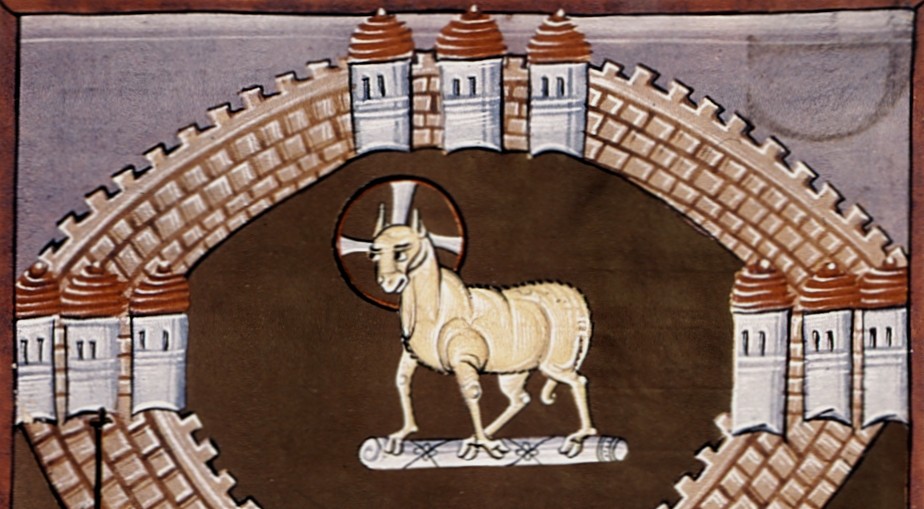In Revelation, faithful testimony is peaceable—not necessarily civil
The disruptive way of the Lamb

Revelation stands out as the most overtly political book in the New Testament. The Apocalypse cartoons Rome as a warlike monster (chapter 13) and an intoxicated prostitute (17–18), drunk on the blood of Jesus’ followers. Along the way it condemns Rome for its violence, exploitation, and idolatry. And despite cosmic scope of its vision, Revelation sets forth a role for the beleaguered churches: they must persist (13:10), for through their faithful testimony they will conquer the fearsome monster (12:11).
We reflect on Revelation amid a public controversy over civility. Trump administration officials associated with the policy of separating children from their parents have encountered public shunning. Activists drove Homeland Security secretary Kirstjen Nielsen and presidential advisor Stephen Miller from Mexican restaurants, while a Virginia restaurant refused to serve White House press secretary Sarah Huckabee Sanders. Some voices decry the lack of civility shown in these incidents, others celebrate the public reinforcement of humane values, and still others call hypocrisy on those who call for civility while supporting the least civil president in history. Even Donald Trump’s political opponents find themselves divided on the question.
In moments of stress and discernment, we Christians typically turn to scripture for guidance. We look not for proof texts that justify our biases but instead for stories, images, and patterns, hoping these will open our imaginations concerning God’s ways in the world. One passage that deeply forms my own imagination is Revelation 5.
As a tiny movement gathered around a would-be messiah whom Roman authorities crucified, early Christians rarely resisted the Roman order directly. Attorney General Jeff Sessions conjured a storm of controversy by citing Romans 13:1–7 as an authority for separating migrant children from their parents. Romans 13 certainly calls for submission to the authorities, but its larger context involves admonitions for believers to look out for their “weaker” colleagues. A similar wariness inflects 1 Peter’s call for believers to “honor the emperor” (2:13–17). Addressing believers as “aliens and exiles” (2:11), 1 Peter repeatedly warns them to prepare for unjust persecution (2:12; 3:13–17; 4:12–19).
Revelation likewise addresses a vulnerable audience. Although the seven churches in chapters 2–3 differ in terms of their relative power and vulnerability, John speaks to them as a partner in their persecution and persistence (1:9). He knows believers who have died for their testimony (2:13; 6:9–11), and he hears their cry: “Sovereign Lord, holy and true, how long will it be before you avenge our blood on the inhabitants of the earth?” (6:11). Believers may indeed conquer the monster, but only at the risk of their lives (12:11).
So it is absolutely critical to examine how Revelation imagines power. The classic passage occurs in chapter 5. His churches under duress, John enters the heavenly throne room. There he beholds the One seated upon the throne, who receives worship from glorious heavenly beings. The One on the throne holds a scroll. We sense the scroll is significant; later we learn that it contains the fate of the world. Then John hears a portentous question: “Who is worthy to open the scroll and break its seals?” (5:2). Who holds the authority to unroll history?
At this point Revelation plays a trick on us hungry readers. At first John weeps, for it seems no one is worthy to unseal the scroll. Then a heavenly being, an elder, proclaims that the Lion of Judah has conquered. He is worthy to open the scroll.
We biblical scholars are trained to avoid describing how the readers of a text might have responded. It’s a matter of basic humility: the history of interpretation shows us how inaccurate our guesses would be. I’ve already broken this rule once, and I will do so again: a lion is just what John’s churches need.
It takes a lion to counter the monster. “Who is like the Beast,” cry the world’s citizens, “and who can fight against it?” (13:4). Surely it takes power to crush power. The only thing that can stop a bad emperor with a sword is a good emperor with a sword, right?
Yet having promised a lion, Revelation delivers no lion. A lamb appears instead—a lamb who has suffered a mortal wound, no less. Nowhere in Revelation does a lion appear. Instead, Revelation’s primary symbol is the Lamb. The Lamb does carry a sword. But that sword protrudes from the Lamb’s mouth. The Lamb, Revelation’s faithful witness (1:5), fights through the power of its testimony. When Rome is displaced with the New Jersualem, we behold the Tree of Life. Its leaves provide not domination but the healing of the nations (22:2).
I find the demand for civility troubling in our present moment. In a time of great unrest and violence, we ask marginalized people to show good manners while others are kicking them in the teeth. Too easily we dismiss the disruptive examples of the abolitionists, the suffragettes, the civil rights demonstrators, and those who overcame Apartheid. I suggest instead that Christians turn to the image of the Lamb: so disruptive as to provoke violence, yet persisting in faithful testimony. Faithful witness can be peaceable without necessarily qualifying as civil.
A powerful poetic symbol, the Lamb does not prescribe a single faithful response to every injustice. Nor should we expect such from the Bible, as if it were a user manual with a handy-dandy index. In extreme circumstances Christians may be called to violence, knowing that violence is sin and that it corrupts the world and our souls. Dietrich Bonhoeffer taught us that. The Lamb’s way, however, is the way of persistent, disruptive, and faithful testimony. The Lamb’s testimony does not require violence, nor does it rely upon demeaning other people—though Revelation surely does trade in debasing rhetoric. The Lamb invites us to be “wise as serpents and innocent as doves,” knowing all the time we may be sheep among wolves (Matt 11:16).





